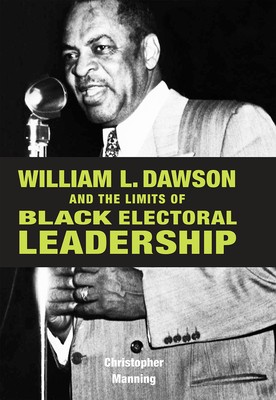
- We will send in 10–14 business days.
- Author: Christopher Manning
- Publisher: Northern Illinois University Press
- ISBN-10: 0875803954
- ISBN-13: 9780875803951
- Format: 16 x 23.9 x 2.3 cm, hardcover
- Language: English
- SAVE -10% with code: EXTRA
William L. Dawson and the Limits of Black Electoral Leadership (e-book) (used book) | bookbook.eu
Reviews
Description
A native of Georgia, William L. Dawson experienced a political awakening during World War I when he witnessed the U.S. military's unfair treatment of black soldiers. After the war, he became involved in the Republican Party in Chicago and, in 1933, won election as Second Ward Alderman. When his campaign against discrimination in housing and employment failed and he recognized that Republicans were losing power, Dawson decided to switch parties and change tactics. In 1938, he joined forces with two former Army colleagues to create an independent black wing of the Democratic Party.
The plan succeeded, and within four years, Dawson was elected as a representative of the First Congressional district. Over the next decade, he became one of the most powerful black politicians of the twentieth century. Dawson was the first African American to create and sustain a powerful black Democratic faction in Chicago, to chair a standing committee in Congress, to serve as vice-chairman of the Democratic Party, and to receive a Cabinet nomination. Despite these personal achievements, Dawson was not as successful in making gains for his constituents.
This detailed analysis of Dawson's career--from his work with the local Republican Party in Chicago in the 1920s to his declining years as a Congressman in Washington, D.C., four decades later--assesses the viability of electoral politics as a tool for racial advancement. Manning broadens our understanding of the development of modern American politics by outlining the strengths and limitations of black electoral leadership in the postwar era. He argues that black electoral leadership, as embodied in Dawson's political strategies, provided considerable opportunities for advancing a racially progressive agenda at the national level of the Democratic Party but faced severe limitations within Congress and could do nothing to ease systemic inequality in Chicago. This political biography will appeal to scholars of African American history, to U.S. political historians, and to those interested in black politics.
EXTRA 10 % discount with code: EXTRA
The promotion ends in 19d.18:15:52
The discount code is valid when purchasing from 10 €. Discounts do not stack.
- Author: Christopher Manning
- Publisher: Northern Illinois University Press
- ISBN-10: 0875803954
- ISBN-13: 9780875803951
- Format: 16 x 23.9 x 2.3 cm, hardcover
- Language: English English
A native of Georgia, William L. Dawson experienced a political awakening during World War I when he witnessed the U.S. military's unfair treatment of black soldiers. After the war, he became involved in the Republican Party in Chicago and, in 1933, won election as Second Ward Alderman. When his campaign against discrimination in housing and employment failed and he recognized that Republicans were losing power, Dawson decided to switch parties and change tactics. In 1938, he joined forces with two former Army colleagues to create an independent black wing of the Democratic Party.
The plan succeeded, and within four years, Dawson was elected as a representative of the First Congressional district. Over the next decade, he became one of the most powerful black politicians of the twentieth century. Dawson was the first African American to create and sustain a powerful black Democratic faction in Chicago, to chair a standing committee in Congress, to serve as vice-chairman of the Democratic Party, and to receive a Cabinet nomination. Despite these personal achievements, Dawson was not as successful in making gains for his constituents.
This detailed analysis of Dawson's career--from his work with the local Republican Party in Chicago in the 1920s to his declining years as a Congressman in Washington, D.C., four decades later--assesses the viability of electoral politics as a tool for racial advancement. Manning broadens our understanding of the development of modern American politics by outlining the strengths and limitations of black electoral leadership in the postwar era. He argues that black electoral leadership, as embodied in Dawson's political strategies, provided considerable opportunities for advancing a racially progressive agenda at the national level of the Democratic Party but faced severe limitations within Congress and could do nothing to ease systemic inequality in Chicago. This political biography will appeal to scholars of African American history, to U.S. political historians, and to those interested in black politics.


Reviews